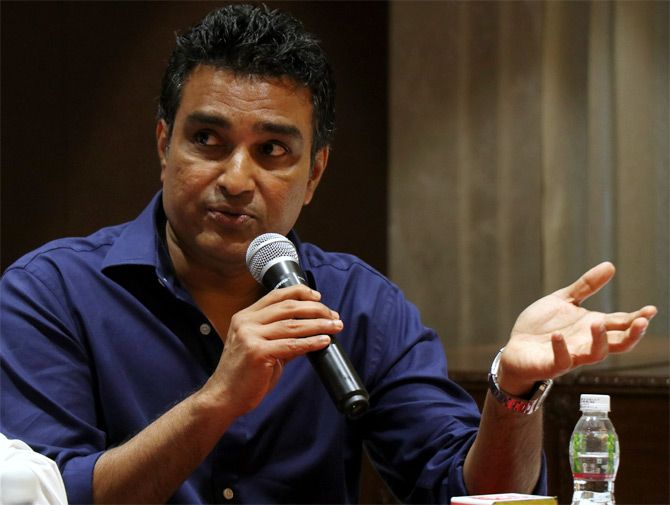'It is time to be humble and offer Test cricket to fans as per their convenience.'
'The only way to get more people to Test cricket and increase its viewership, its popularity and its quality by having day-night Test matches.'
Harish Kotian/Rediff.com listens to Sanjay Manjrekar deliver the Dilip Sardesai Lecture.

Sanjay Manjrekar called upon the administrators to take strong measures to save Test cricket including having regular day-night Test matches and improving the over rates.
"Why aren't we playing more day-night Test matches when it is a no brainer that it will bring in more viewership?" Manjrekar asked as he delivered the ninth Dilip Sardesai Lecture at the Cricket Club of India in Mumbai on Monday, October 1.
"In places where crowds don't turn up, you need to have day-night Tests," he added.
The current Indian team management rejected offers to host a day-night Test during the two-Test series against the West Indies, while also turning down the request from Cricket Australia to play a day-night Test during the tour next month.
"An offer was recently rejected by India because the players are wary of it, wary of the pink ball, the dew factor etc. I have always believed that conditions are never unfair if it is same for both sides," Manjrekar stated.
"So what is happening is that we want to give the players the perfect conditions to play even if no one will watch it," Manjrekar, now a respected commentator, said.
"It is not that there is zero interest in Test cricket it is just that people can't come to the stadium to watch Test cricket or for that matter watch on TV. It is just because we are cocky, in the sense that we have kept the timings of Test matches such that it is working hours for people," he added.
"Gone are the days when people used to fill up every seat and sit at the Eden Gardens, it is time to be humble and offer Test cricket to fans as per their convenience. The only way to get more people to Test cricket and increase its viewership, its popularity and thereby its quality by having day-night Test matches," he pointed out.
Manjrekar called upon the Board of Control for Cricket of India to not bow down to the star power of the players and take tough decisions to save Test cricket in India.
"There was a time when the Indian players were at the mercy of the BCCI, there were clashes between the players and the Board over payment of salaries, in 1989 the unauthorised US trip, the players and BCCI were always at loggerheads, thank god that is in the past."
"But we must be careful to not go to the other extreme and try to keep players happy come what may or at the cost of the game. Do what is best for the game for its long term health and make the players join in, even if they are reluctant, they will thank us later," Manjrekar said.

Reacting to Manjrekar's comments, Committee of Administrators member Diana Edulji said a day-night Test will happen in the near future.
"We were not ready for it at that time, but it will happen, it will happen," Edulji said.
Manjrekar believes that another threat looming large for the survival of Test cricket is the mushrooming of T20 leagues around the world, attracting more and more young players every year.
"Today's Test matches are played in front of empty stands and the IPL in front of frenzied crowds of more than 50,000 plus millions watching on TV. And guess what, it pays better too, in fact, a lot better."
"So we have a reverse scenario now as compared to the 90s. It is about playing the IPL at all costs, the player injuries now surface only before or after the IPL."
"IPL offers you fame as well as money. Now who will say no to this?" he asked.
"Why train so hard for something that only a few people watch and does not pay much?"
Manjrekar, who played 37 Tests for India from 1987 to 1996, says today's players are not willing nor are they motivated enough to represent their country in the longer format.
"Test cricket is just too goddamn hard. So it is no wonder that many are choosing T20 leagues over Test matches. Playing for the country and all that is an emotion one feels only when it is an ICC event now whereas such random, meaningless country versus country cricket is going on now that playing for the country feels not such a big deal anymore or a matter of great pride like it used to be when matches were fewer," he said.
"So, more and more players are training themselves to become good white ball players," he added.
"Another issue in modern day cricket which Manjrekar is unhappy about is the slow over rates. He believes that is another major factor in keeping the crowds away.
"We need to do something about the over rates. No way will the sport appeal or connect with the youth when most of the time they see players walking or standing or having drinks and thus having a devastating effect on the over rate."
"There was a time when 19 overs were bowled in an hour and now it is down to 12. In the Asia Cup final, there was 40 minutes over time," he said.
Manjrekar says the administrators need to come down heavily on the players and teams guilty of slow over rates as the current penalty system is not proving to be a big enough deterrent.
"The slow over rates is entirely down to players being allowed to have their own. The officials need to get a lot more strict, the fact is that there is too much leniency given to the players."
"It is vital that we are on the ball keeping a close eye on how cricket is being consumed by the market and react accordingly."
"If cricket has to thrive, the custodians of the game have to be pragmatists and not romantics because romantics will stay with the old and sometimes it is not good for the game."











